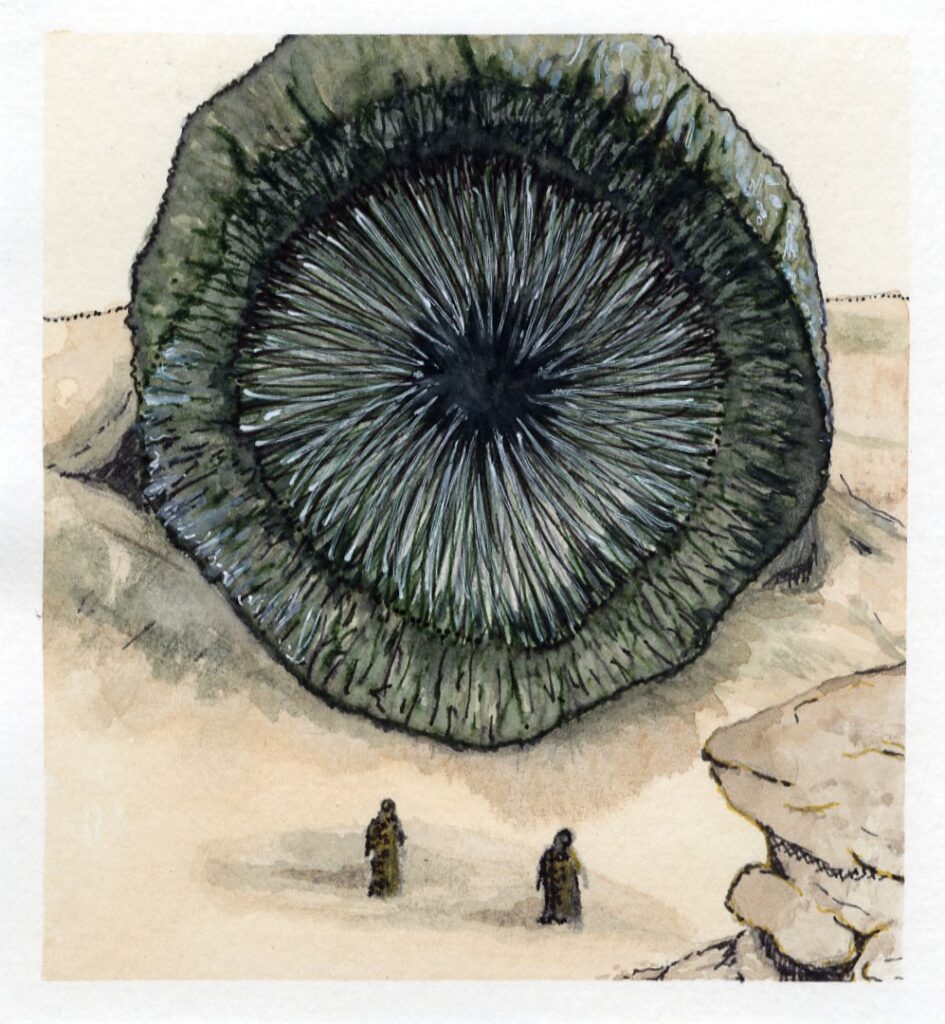Alexandria Smith ’27
Staff Writer
Note: This article contains spoilers for Dune: Part Two.
Dune: Part Two came to theaters on March 1 and immediately captured audiences’ attention. The long-awaited sequel to Dune, released in 2021, is based on the eponymous bestselling book series by Frank Herbert. With a star-studded cast, Dune: Part Two was bound for success, but did it meet expectations? Yes.
Out of all the movies I have seen in 2024, I have not walked away as awe-struck and thrilled as when leaving Dune: Part Two. This absolutely killer movie is witty, fascinating, and so well done. This film’s cinematography, score, and acting is an immediate 10/10. The charm of Dune: Part Two is its ability to awaken the viewer’s curiosity with a much more complicated and intense action-packed plot than its predecessor.
Dune: Part Two picked up right where Dune left off: Paul Atraides (played by our favorite Timothée Chalamet) kills a Freman to prove that he can join them. Dune: Part Two opens with a scene of Paul and Lady Jessica (Rebecca Ferguson) going through the desert with the Fremen as the story unfolds.
The start of the movie gave me chills, seeing Paul get closer to the visions we had witnessed in the first movie; everything seemed to fall together. Shortly into the movie, prophecy and religious propaganda dynamics arise as some Fremen are convinced that Paul is their Lisan Al Gaieb. As Lady Jessica is forced to drink the Water of Life, ultimately allowing her to take up the role of Reverend Mother for the Fremen, her demeanor changes completely.
She turns evil, convinced that the only way to survive is by instilling more fear into the Fremen and encouraging them to believe in the Lisan Al Gaieb prophecy. This dynamic is unique for typical cinema, as Lady Jessica transforms from a fearful, loving, motherly female character into a powerful and all-consuming dark force. Compared to women’s typical representation in media, the transformation of Lady Jessica is significant to note as, to me, she became the most fascinating and complex character. Lady Jessica wielded so much power until she realized she lived in fear of everything around her, grappling for strength, even though she already had it. The transition from her loving and motherly personality is interesting because cinema doesn’t typically highlight women becoming darker and less feminine.
It is hard to make a bold statement in today’s political climate. Dune: Part Two beautifully encapsulates the promises of political leaders that can be used against hopeful people. The Fremen, oppressed for centuries, wanted to see in Paul the prophecy they had been promised, a prophecy that was told to them over time by those in power. Though they believed they had found freedom, Paul just became their new master. We are sold promises of a better life and a more trustworthy democracy so often in politics, seeing charismatic and dynamic leaders as a light at the end of the tunnel. However, Dune warns against this, calling for each of us to remain hopeful but critically analyze the words of those in power.
After Paul’s mother forces him to drink the Water of Life, he no longer fights against his future as a prophet, taken over with greed just like his mother. It was heartbreaking to see how his mother exerted her wishes on him, forcing him to fulfill the role of the Lisan Al Gaieb. The Paul we had known throughout the film was lost, and I was struck by the harsh transition in his body language and demeanor.
Paul completely shifts from being a thoughtful and loving young man who wants to learn about Fremen’s ways and culture. He no longer wanted to merely protect the Fremen but to use their army as a force to combat those who stood against him and allowed the House Atreides to Fall. This is not only a white savior narrative but also showcases the corruption within power. No matter how hard Paul resisted, he inevitably gave in to his destiny.
Throughout the film, the messages of politics and religion reveal themselves as the fundamental driving forces. Paul, once he sees and understands everything, is consumed by power. Paul demands control of the empire. Power corrupts, and absolute power corrupts absolutely. The uncertain ending of Dune left me grappling with whether they should be glad Paul won or sad that he lost himself. These issues are never one-sided, and I was faced with the fact that no one in this story is left a hero, and destruction will ensue. The film allowed me to put Paul on a pedestal and root for him, just as Fremen did, but once that veil was removed from the viewer’s eyes, I saw the duality in our lives. We so often believe the promises of leaders, whether political or religious and are left unaware of their immense power over us. Dune is an example of how no individual should be glorified in the name of a savior and warns us against the idea of a false messiah.
This movie hasn’t left my mind since I watched it. It will leave a lasting impact on lovers of science fiction and political commentary alike. The sands are shifting under all of us, and as beautifully depicted in Dune: Part Two, we need to tread delicately.
Photo Courtesy of Anna Grez ’27



